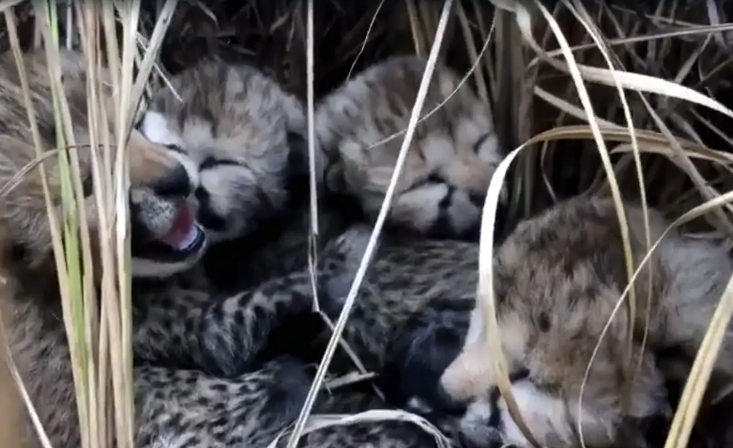India: Four Cheetah Cubs Born 70 Years After Extinction
India on Wednesday announced the birth of four cheetah cubs to one of eight cheetahs brought to the country from Namibia in September 2022 under 'Project Cheetah,' an effort to reintroduce the animal after they were declared extinct in India in 1952.

Facts
- India on Wednesday announced the birth of four cheetah cubs to one of eight cheetahs brought to the country from Namibia in September 2022 under 'Project Cheetah,' an effort to reintroduce the animal after they were declared extinct in India in 1952.1
- India's Environment Minister shared a photo and video of the cubs on Twitter, calling the development a "momentous event in India's wildlife conservation history."2
- The birth of the cubs takes the total number of the world's fastest land animal in India to 23, after 12 cheetahs were brought to India from South Africa last month. It also comes days after a female cheetah named Sasha died of renal failure at the Kuno National Park.3
- India and South Africa signed a Memorandum of Understanding in January to translocate 12 cheetahs annually over the next eight to 10 years, with the aim of establishing a diverse cheetah population and promoting their conservation in the country.4
- The cheetah, listed globally as vulnerable on the International Union for the Conservation of Nature Red List of Threatened Species, became extinct from India decades ago due to shrinking grasslands and overhunting.1
- There is currently a world population of around 7K cheetahs, most of which are found in South Africa, Namibia, and Botswana. Over the past decade, thousands of cheetahs have reportedly been trafficked to wealthy buyers abroad who keep them as illegal pets.5
Sources: 1Al Jazeera, 2NDTV, 3BBC News, 4Downtoearth, and 5Animals.
Narratives
- Narrative A, as provided by Cheetah Conservation Fund. After decades being extinct in India, cheetahs have finally come home as part of a well-coordinated relocation effort to restore their presence on the subcontinent. There is so much optimism about the future of the cheetah population in India, as the animals look set to once again flourish in the nation.
- Narrative B, as provided by India Spend. Relocating cheetahs to India is a mistake for conservation, as the country does not have the habitat or prey to sustainably support the endangered species. While there is a history of cheetahs having thrived in India, the subspecies translocated to India differ from the Asiatic cheetah that originally roamed. Many risks come with relocation efforts and, in this case, the pros do not outweigh the cons.






